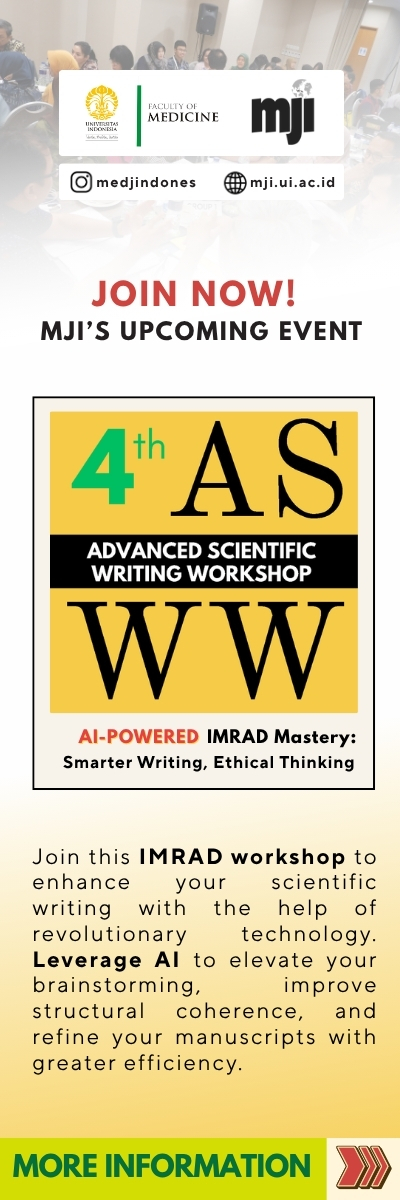The knowledge retention after continuing health education among midwives in Indonesia
DOI:
https://doi.org/10.13181/mji.v27i2.2413Keywords:
digestive health, knowledge, midwives, nutrition, parentingAbstract
Background: Amongst the Health Care Professionals, midwife has a strategic role in taking care of both mother and child in contributing to their survival, health, and wellbeing. The retaining midwife’s knowledge and quality of care through training on specific skills is strongly needed. This study aimed to evaluate the knowledge retention among midwives after the provision of digestive health, nutrition, and parenting education sessions at immediate and three months after the education.
Methods: A serial pre-post intervention experimental study was conducted from January to July 2016 to evaluate the knowledge before (pre-test), immediate after (post-test), and three months after the provision of three sessions of digestion health, nutrition, and parenting (character building) topics by the experts which covered from several areas in Indonesia. The improvement of the sufficient knowledge proportion time by time was analyzed by using McNemar test.
Results: The low immediate response rate (77.2%) and very low response after the 3-month follow-up (26.4%) were revealed during the study. At baseline, less than 50% of the subjects had sufficient knowledge on digestive health, nutrition, and parenting. At immediate after and after three months, there were significant improvements in the proportion of sufficient knowledge in nutrition and parenting topics. However, there was a declining of sufficient knowledge at after 3 months group compared to immediate group.
Conclusion: The knowledge retention from the continuing health education among widwives in Indonesia decreased after 3 months.
Downloads
References
Biro MA. What has public health got to do with midwifery? Midwives' role in securing better health outcomes for mothers and babies. Women Birth. 2011;24(1):17-23. https://doi.org/10.1016/j.wombi.2010.06.001
Hennessy D, Hicks C, and Koesno H. The training and development needs of midwives in Indonesia: paper 2 of 3. Hum Resour Health. 2006;4:9. https://doi.org/10.1186/1478-4491-4-9
Agrawal N, Kumar S, Balasubramaniam SM, Bhargava S, Sinha P, Bakshi B, et al. Effectiveness of virtual classroom training in improving the knowledge and key maternal neonatal health skills of general nurse midwifery students in Bihar, India: a pre- and post-intervention study. Nurse Educ Today. 2016;36:293-7. https://doi.org/10.1016/j.nedt.2015.07.022
Mueler NT, Bakacs E, Combellick J, Grigoryan Z, Dominguez-Bello MG. The infant microbiome development: mom matters. Trends Mol Med. 2015;21(2):109-17. https://doi.org/10.1016/j.molmed.2014.12.002
Sodjinou R, Bosu WK, Fanou N, Déart L, Kupka R, Tchibindat F, et al. Nutrition training in medical and other health professional schools in West Africa: the need to improve current approaches and enhance training effectiveness. Glob Health Action. 2014;7:24827. https://doi.org/10.3402/gha.v7.24827
Oriach CS, Robertson RC, Stanton C, Cryan JF, Dinan TG. Food for thought: the role of nutrition in the microbiota-gut-brain axis. Clin Nutr Exp. 2016;6:25-38. https://doi.org/10.1016/j.yclnex.2016.01.003
Sykes LL, Walker RL, Ngwakongnwi E, Quan H. A systematic literature review on response rates across racial and ethnic populations. Can J Public Health. 2010;101(3):213-9.
Cook JV, Dickinson HO, Eccles MP. Response rates in postal surveys of healthcare professionals between 1996 and 2005: an observational study. BMC Health Serv Res. 2009;9:160. https://doi.org/10.1186/1472-6963-9-160
Hunter AT. Perceived effectiveness of clinical e-learning for Georgia midwives. Dissertation. University of South Carolina; 2014.
Edwards PJ, Roberts I, Clarke MJ, DiGuiseppi C, Wents R, Kwan I, et al. Methods to increase response to postal and electronic questionnaires. Cochrane Database Syst Rev. 2009;8(3):MR000008. https://doi.org/10.1002/14651858.MR000008.pub4
Cunningham CT, Quan H, Hemmelgarn B, Noseworthy T, Beck CA, Dixon E, et al. Exploring physician specialist response rates to web-based surveys. BMC Med Res Methodol. 2015;15:32. https://doi.org/10.1186/s12874-015-0016-z
Gao LL, Sun K, Chan SW. Social support and parenting self-efficacy among Chinese women in the perinatal period. Midwifery. 2014;30(5)532-8. https://doi.org/10.1016/j.midw.2013.06.007
Arrish J, Yeatman H, Williamson M. Midwives and nutrition education during pregnancy: a literature review. Women Birth. 2014;27(1):2-8. https://doi.org/10.1016/j.wombi.2013.02.003
Naeem N. Which knowledge and skills do participants retain after attending medical education training workshops? Creat Educ. 2016;7:870-7. https://doi.org/10.4236/ce.2016.76091
Ferreira JJ, Maguta L, Chissaca AB, Jussa IF, Abudo SS. Cohort study to evaluate the assimilation and retention of knowledge after theoretical test in undergraduate health science. Porto Biomed J. 2016;1(5):181-5. https://doi.org/10.1016/j.pbj.2016.10.006
Malau-Aduli BS, Lee AY, Cooling N, Catchpole M, Jose M, Turner R. Retention of knowledge and perceived relevance of basic sciences in an integrated case-based learning (CBL) curriculum. BMC Med Educ. 2013;13:139. https://doi.org/10.1186/1472-6920-13-139
Published
How to Cite
Issue
Section
License
Authors who publish with Medical Journal of Indonesia agree to the following terms:
- Authors retain copyright and grant Medical Journal of Indonesia right of first publication with the work simultaneously licensed under a Creative Commons Attribution-NonCommercial License that allows others to remix, adapt, build upon the work non-commercially with an acknowledgment of the work’s authorship and initial publication in Medical Journal of Indonesia.
- Authors are permitted to copy and redistribute the journal's published version of the work non-commercially (e.g., post it to an institutional repository or publish it in a book), with an acknowledgment of its initial publication in Medical Journal of Indonesia.





































